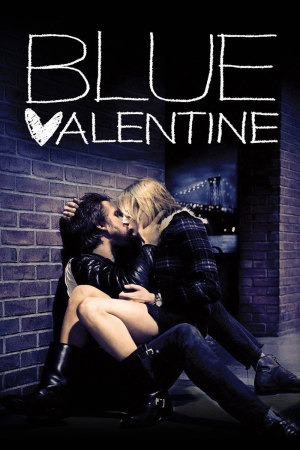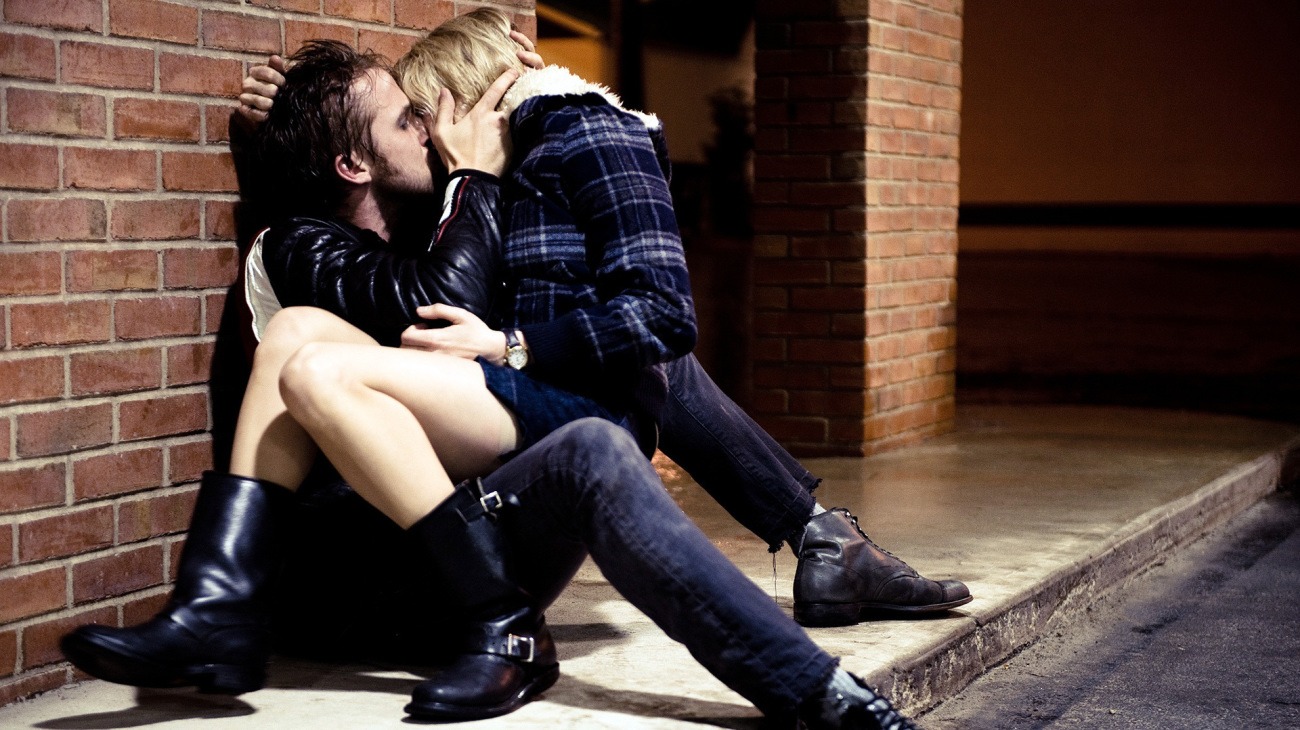
Scenes from a marriage
The moment that typifies Blue Valentine for me comes relatively early, in the first 15 minutes anyway, and finds thirtyish Cindy (Michelle Williams) arriving late to her daughter's Independence Day recital. She has just, on the way home from work, found the family's lost dog, dead on the side of the road. As she settles in next to her husband Dean (Ryan Gosling), she appears to be holding together fairly well, but when she softly whispers what happened, her voice breaks. There is a long, terribly long, skin-crawlingly long moment, in which neither moves (it's probably about three seconds, but they are drawn-out, miserable seconds), and Dean says, in the roughest voice he can manage in a whisper - I am paraphrasing - "I kept telling you to lock the fucking cage". No sympathy, no arm around the shoulder, for a woman who self-evidently needs it; just a curt accusation.
It's a moment that repeats, in different registers, throughout the harshest, most brutalising American film of 2010, a movie that I described, minutes after walking out of the theater, as the cinematic equivalent having Derek Cianfrance, director and co-writer (with Cami Delavigne and Joey Curtis), rubbing your face in gravel for an hour and fifty-minutes, not excluding the end credits, wherein (having apparently concluded that we didn't suffer enough) the filmmaker includes a musical track that just adds one last, mean "fuck you" to the audience. I am probably not successfully making this sound like one of the best filmgoing experiences I've had in the last several months.
To get, eventually, to the point, Blue Valentine plays out two levels in tandem: first, it shows Cindy and Dean's marriage after several years of misuse have left it in a fairly dysfunctional state; this is intercut with the story of how they first met, as two freewheeling young folks on the streets of New York. The order of things is tremendously important. Before we ever meet the couple in high spirits, we have already seen what would happen to them in only a few years, and it is not a very happy place that they end up. Armed with foreknowledge, the sight of the two kids, happy and goofily in love, isn't just ironic, it's perfectly heartbreaking. The "past" segments of the film, to all intents and purposes, acts like the factory model hipster indie love story, artfully artless in its terrifically grainy 16mm and loosey-goosey handheld, its soundtrack, and so on. Except that every one of those half-quirky moments plays with the looming dread of a top-notch horror movie, because we already know better. We've seen the pettiness and backbiting; we've been exposed to the depths of Dean's alcoholism and scary lack of emotional maturity and Cindy's monstrously quiet passive-aggressiveness, and can see the embryonic versions of those things, and what the characters find silly and fun, we find unbearably sad - sadder still because as played by two extraordinarily gifted actors, the young versions of the characters are so easy to like, and their love story so attractive
Williams and Gosling are hogging the lion's share of praise, but what really gets the film from point A to B is Cianfrance's inventive, immersive direction: besides the obvious division of the film into 16mm and video for the past and present sequences, there's a host of behind the scenes anecdotes that argue that the whole film amounts to a massive psychological experiment perpetrated on the two actors, with the director pushing them through Method acting on crack in the pursuit of the rawest, truest performances he could get. The short version is that the past story was shot on the fly, with little rehearsal and few retakes, fun and laid-back; while the present was laden down with one take after the other, Cianfrance thrusting the camera right into the actors faces to the point where it's almost physically uncomfortable to watch on the big screen, and generally trying to push Williams and Gosling to be as worn out and irritated as he could make them - sort of like Bresson, only with the intention of intensifying, rather than flattening, their emotional states (of course with two actors of less talent and less bravery, none of this would work, and I certainly do not want to diminish their achievements in any way). This might sound like trivia, but it matters so much: the end result is obvious enough in the profound disconnect between past and present, and the incredible depth of feeling in the present scenes especially is quite difficult to put into words. There is something raw and naked that translates from the actors to the audience, even mediated by the movie screen; two performances that showcase how life-affirming is the joy of momentary love and affection, and then plumb depths shockingly unlike most of what we expect to see in the movies.
The film is a smoothly, even elegantly crafted piece in which everything serves to further its emotional impact: the lighting, the editing, the sound mixing (it's subtly harsh, not so that you notice it but enough that you feel a little on edge) are all meant to augment the central depiction of two personalities in crisis. For the most part, Blue Valentine is quite excellent, though at times, mostly towards the end, Cianfrance's eagerness to avoid visually privileging one character over the other becomes almost schematic; though of course it's this same tendency that gives the film an incredibly even-handed treatment of two people who are not "bad" so much as they are bad for each other, and the brashness with which Cianfrance moves our sympathy now to Cindy, now to Dean, now back to Cindy (and in the course of a single long shot, sometimes!) is one of the film's chiefest pleasures, assuming "pleasure" is the right word. The only other real complaint I have about the film is that it's so intense but it lacks any real catharsis, instead leaving us hanging on a moment of frustration and broken communication and universal unhappiness at its most piercing. There's no denying that something this real and this harrowing in its depiction of a profound human experience is valuable, but it comes awfully close to cruelty against the viewer.
For the record, "this movie made me feel too much" is the best kind of problem to have.
9/10
It's a moment that repeats, in different registers, throughout the harshest, most brutalising American film of 2010, a movie that I described, minutes after walking out of the theater, as the cinematic equivalent having Derek Cianfrance, director and co-writer (with Cami Delavigne and Joey Curtis), rubbing your face in gravel for an hour and fifty-minutes, not excluding the end credits, wherein (having apparently concluded that we didn't suffer enough) the filmmaker includes a musical track that just adds one last, mean "fuck you" to the audience. I am probably not successfully making this sound like one of the best filmgoing experiences I've had in the last several months.
To get, eventually, to the point, Blue Valentine plays out two levels in tandem: first, it shows Cindy and Dean's marriage after several years of misuse have left it in a fairly dysfunctional state; this is intercut with the story of how they first met, as two freewheeling young folks on the streets of New York. The order of things is tremendously important. Before we ever meet the couple in high spirits, we have already seen what would happen to them in only a few years, and it is not a very happy place that they end up. Armed with foreknowledge, the sight of the two kids, happy and goofily in love, isn't just ironic, it's perfectly heartbreaking. The "past" segments of the film, to all intents and purposes, acts like the factory model hipster indie love story, artfully artless in its terrifically grainy 16mm and loosey-goosey handheld, its soundtrack, and so on. Except that every one of those half-quirky moments plays with the looming dread of a top-notch horror movie, because we already know better. We've seen the pettiness and backbiting; we've been exposed to the depths of Dean's alcoholism and scary lack of emotional maturity and Cindy's monstrously quiet passive-aggressiveness, and can see the embryonic versions of those things, and what the characters find silly and fun, we find unbearably sad - sadder still because as played by two extraordinarily gifted actors, the young versions of the characters are so easy to like, and their love story so attractive
Williams and Gosling are hogging the lion's share of praise, but what really gets the film from point A to B is Cianfrance's inventive, immersive direction: besides the obvious division of the film into 16mm and video for the past and present sequences, there's a host of behind the scenes anecdotes that argue that the whole film amounts to a massive psychological experiment perpetrated on the two actors, with the director pushing them through Method acting on crack in the pursuit of the rawest, truest performances he could get. The short version is that the past story was shot on the fly, with little rehearsal and few retakes, fun and laid-back; while the present was laden down with one take after the other, Cianfrance thrusting the camera right into the actors faces to the point where it's almost physically uncomfortable to watch on the big screen, and generally trying to push Williams and Gosling to be as worn out and irritated as he could make them - sort of like Bresson, only with the intention of intensifying, rather than flattening, their emotional states (of course with two actors of less talent and less bravery, none of this would work, and I certainly do not want to diminish their achievements in any way). This might sound like trivia, but it matters so much: the end result is obvious enough in the profound disconnect between past and present, and the incredible depth of feeling in the present scenes especially is quite difficult to put into words. There is something raw and naked that translates from the actors to the audience, even mediated by the movie screen; two performances that showcase how life-affirming is the joy of momentary love and affection, and then plumb depths shockingly unlike most of what we expect to see in the movies.
The film is a smoothly, even elegantly crafted piece in which everything serves to further its emotional impact: the lighting, the editing, the sound mixing (it's subtly harsh, not so that you notice it but enough that you feel a little on edge) are all meant to augment the central depiction of two personalities in crisis. For the most part, Blue Valentine is quite excellent, though at times, mostly towards the end, Cianfrance's eagerness to avoid visually privileging one character over the other becomes almost schematic; though of course it's this same tendency that gives the film an incredibly even-handed treatment of two people who are not "bad" so much as they are bad for each other, and the brashness with which Cianfrance moves our sympathy now to Cindy, now to Dean, now back to Cindy (and in the course of a single long shot, sometimes!) is one of the film's chiefest pleasures, assuming "pleasure" is the right word. The only other real complaint I have about the film is that it's so intense but it lacks any real catharsis, instead leaving us hanging on a moment of frustration and broken communication and universal unhappiness at its most piercing. There's no denying that something this real and this harrowing in its depiction of a profound human experience is valuable, but it comes awfully close to cruelty against the viewer.
For the record, "this movie made me feel too much" is the best kind of problem to have.
9/10






